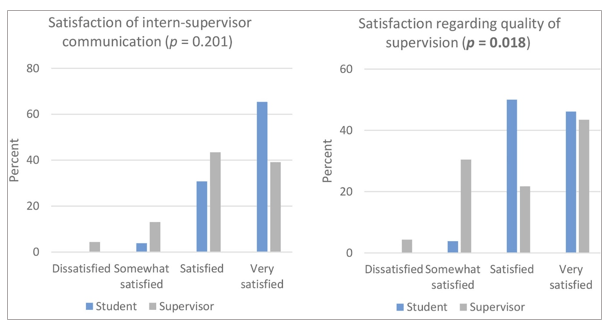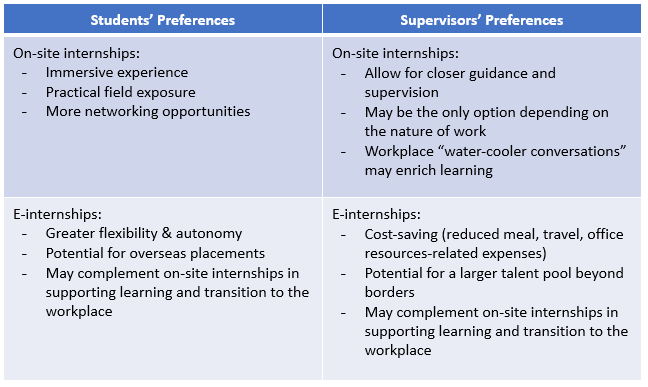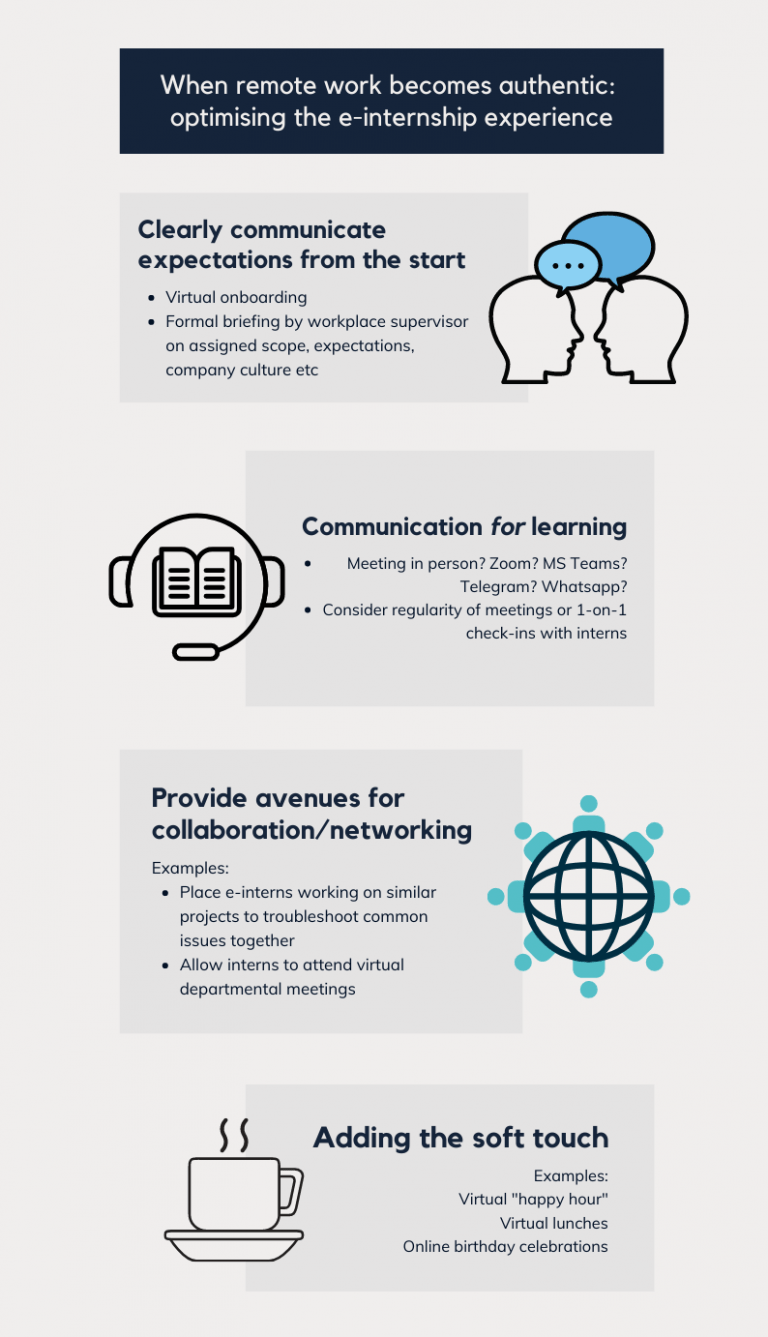Cecilia TENG and Raymond LIM
Saw Swee Hock School of Public Health (SSHSPH)
Cecilia and Raymond discuss the learning gains and challenges of e-internships, based on the feedback shared by interns and workplace supervisors.
-

Photo courtesy of Shutterstock.
Teng, C. W. C., & Lim, B. T. R. (2022, Feb 17). Optimising the learning experience in e-Internships. Teaching Connections. https://blog.nus.edu.sg/teachingconnections/2022/02/17/optimising-the-learning-experience-in-e-internships/
As exemplified by the COVID-19 pandemic, tackling public health issues requires the integration of knowledge and skills across various disciplines. In alignment with NUS’ strategic push towards interdisciplinary learning in preparing future-ready graduates, undergraduate public health internships, offered by the Saw Swee Hock School of Public Health (SSHSPH) under the Special Term module “SPH3001 (Public Health Practice)”, provide students from different disciplinary backgrounds with supervised hands-on exposure to real-world public health functions and settings. Through these experiences, students acquire and develop essential related skillsets and perspectives.
Globally, many on-site internships were either delayed, rescinded, or shifted online during COVID-19 (Dani et al., 2020; Holt-White & Montacute, 2020; Pretti et al., 2020, among others). Similarly, when the pandemic first hit Singapore in 2020, all undergraduate public health internships in SPH3001 had to be carried out remotely for the first time (“e-internships”).
e-Internships are virtual work attachments assigned to interns from employers that are carried out remotely and online. In on-site face-to-face internships, most of the intern’s work takes place in-person at the worksite; in e-internships, the intern’s work is conducted virtually, with minimal or no in-person interaction and without having to be located at the worksite.
To better understand the impact of the pandemic on teaching (in terms of supervision) and learning during e-internships, our team analysed feedback from 26 e-interns and 21 workplace supervisors1 using evaluation surveys (Teng et al., 2021). We share in the following sections our findings, reflections on practical implications, and recommendations to optimise learning in e-internships.
What Went Well?
All Likert-type items from the e-intern and supervisor evaluation surveys2 had a high median score of at least 4 (out of 5). Figure 1 shows the distribution of responses from the e-interns and supervisors on the levels of satisfaction towards intern-supervisor communication and supervision quality.

The qualitative comments corroborated with the quantitative findings, that most supervisors and e-interns reported high levels of satisfaction with e-internships, acquired important learning gains, and had good working relationships:
- Autonomy and flexibility: Most supervisors and e-interns were satisfied with the e-internship experience, with the interns citing reasons such as autonomy, flexibility, and adequacy of supervisory support.
- Communication: Supervisors who expressed greater satisfaction with the quality of virtual communication indicated using both synchronous face-to-face and asynchronous platforms for communication, as opposed to those who mainly emailed to communicate.
- Learning gains:
- Technical skills (e.g. literature reviews, report writing, data analysis)
- Thinking skills (e.g. critical thinking, creativity, strategy)
- Soft skills essential in remote work (e.g. self-management skills, time management, virtual communication, online presentation skills)
Challenges
Some of the challenges cited in e-internships include:
- Sense of isolation and disconnectedness, despite frequent virtual communication between e-interns and supervisors.
- Inadequate feedback
- Emails may not be the best way to discuss complex issues, such as teaching the use of a software.
- Asynchronous modes of communication also hinder provision of timely feedback, which interns highly valued:

- Supervisors acknowledged the difficulty in providing close supervision and building rapport in an online environment.
- Limitations of e-internships in fostering traditional soft skills (e.g. public speaking, interpersonal communication, collaboration, and networking
e-Internships Versus On-site Internships: Practical Implications
Despite the challenges faced in e-internships, supervisors were keen to retain the e-talent groomed (refer to the illustrative quotes below) and were also open to offer part-time and/or hybrid internships.


These comments further support the view that e-internships are valued by prospective public health employers.
Table 1 summarises key reasons behind students’ and supervisors’ preferences for on-site and e-internships.
Table 1
Students’ and supervisors’ preferences for on-site and e-internships
How May e-Internships Be Optimised?
As remote work increases and becomes an authentic work experience in a post-COVID-19 world, to address the aforementioned challenges reported in our study, practical recommendations to optimise e-internships are proposed in the following infographic (Figure 2):

 |
TENG Woon Chien Cecilia is a lecturer from the Saw Swee Hock School of Public Health (SSHSPH). She currently teaches undergraduate public health modules, and is passionate about exploring creative ways to increase student engagement. Most of all, she misses interacting with youths in-person. Cecilia can be reached at ephtwcc@nus.edu.sg. |
 |
LIM Boon Tar Raymond is a senior lecturer from the SSHSPH. He currently oversees the undergraduate public health minor and second major programmes, and is passionate about undergraduate pedagogical research. He also misses the face-to-face classroom interaction with students. Raymond can be reached at ephlbtr@nus.edu.sg. |
Endnote
- The workplace supervisors encompassed public health professionals working in academia, government agencies/ministries, healthcare institutions, non-governmental and private organisations.
- Please refer to Teng et al. (2021) for more details about the evaluation survey items and the findings.
References
Dani, R., Kukreti, R., Negi, A., & Kholiya, D. (2020). Impact of COVID-19 on education and internships of hospitality students. International Journal of Current Research and Review, 12(21), 86. http://dx.doi.org/10.31782/IJCRR.2020.SP54
Holt-White, E., & Montacute, R. (2020). COVID-19 and social mobility impact brief #5. Graduate recruitment and access to the workplace. https://dera.ioe.ac.uk/36101/1/Access-to-the-Workplace-Impact-Brief.pdf (accessed 7 Aug 2021)
Pretti, T. J., Etmanski, B., & Durston, A. (2020). Remote work-integrated learning experiences: student perceptions. International Journal of Work-Integrated Learning, 21(4), 401-414. https://www.ijwil.org/files/IJWIL_21_4_401_414.pdf (accessed 16 Feb 2022)
Teng, C. W. C., Lim, B. T. R, Chow, W. S. D., Narayanasamy, S., Liow, C. H., & Lee, J. J. M. (2021). Internships before and during COVID-19: experiences and perceptions of undergraduate interns and supervisors. Higher Education, Skills and Work-Based Learning, Advance online publication. https://doi.org/10.1108/HESWBL-05-2021-0104

